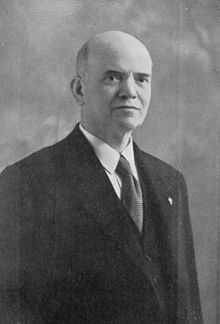Quirino Majorana

Quirino Majorana (28 October 1871 – 31 July 1957) was an Italian experimental physicist who investigated a wide range of phenomena during his long career as professor of physics at the Universities of Rome, Turin (1916–1921),[1] and Bologna (1921–1934), Italy.
Work
He performed a long series of very sensitive gravity shielding experiments from 1918 to 1922, which have never been reproduced. Majorana's experiments determined that mercury or lead around a suspended lead sphere acted as a screen and slightly decreased the Earth's gravitational pull.[2] No attempts have been made to reproduce his results using the same experimental techniques. Other researchers have concluded from other data that if gravitational absorption does exist it must be at least five orders of magnitude smaller than Majorana's experiments suggest.[3]
Critical of Albert Einstein's relativity theory, he tried to disprove Einstein’s postulate on the constancy of the speed of light, but he failed and therefore his experiments confirmed Einstein's postulate.[4] [5] Majorana also confirmed Isaac Newton’s law of universal gravitation to high precision.[6][7][8]
His later work at Bologna was influenced by correspondence with his nephew Ettore Majorana (1906–1938), a great physicist in his own right.[9][10]
References
| Wikisource has original works written by or about: Quirino Majorana |
- ↑ "Eligio Perucca". Virtual Museum: The Directors and Politicians. Retrieved 2009-11-20.
- ↑ Roberto de Andrade Martins (2002). "Majorana’s Experiments on Gravitational Absorption", in: M. R. Edwards (ed.). Pushing Gravity: New Perspectives on Le Sage's Theory of Gravitation. Montreal: Apeiron. Pp. 219-238. ISBN 0-9683689-7-2
- ↑ Roberto de Andrade Martins (1998). "The Search for Gravitational Absorption in the Early 20th Century". In H. Goenner, J. Renn, J. Ritter. The Expanding Worlds of General Relativity. Boston: Birkhäuser Verlag. pp. 3–44. ISBN 0-8176-4060-6.
- ↑ Quirino Majorana (1918). "On the Second Postulate of the Theory of Relativity: Experimental Demonstration of the Constancy of Velocity of the Light reflected from a Moving Mirror". Philosophical Magazine 35 (206): 163–174. doi:10.1080/14786440208635748.
- ↑ Quirino Majorana (1919). "Experimental Demonstration of the Constancy of Velocity of the Light emitted by a Moving Source". Philosophical Magazine, Series 6 37 (217): 145–150. doi:10.1080/14786440108635871.
- ↑ Giorgio Dragoni, Giulio Maltese, & Luisa Atti (2007). "Quirino Majorana's Experiments on the Speed of Light and Gravitational Absorption". Physics in Perspective 9 (3): 281–304. Bibcode:2007PhP.....9..281D. doi:10.1007/s00016-006-0304-4.
- ↑ Alessandro Pesci (2007). "From Unruh Temperature to the Generalized Bousso Bound". Classical and Quantum Gravity 24 (24): 6219–6225. arXiv:0708.3729. Bibcode:2007CQGra..24.6219P. doi:10.1088/0264-9381/24/24/005.
- ↑ Giorgio Dragoni & Giulio Maltese (1997). "Quirino Majorana's Research on Gravitational Absorption: A Case Study in the Misinterpreted Experiment Tradition". Centaurus 39 (2): 141–187. Bibcode:1997Cent...39..141D. doi:10.1111/j.1600-0498.1997.tb00029.x.
- ↑ Ettore Majorana (1987). Lezioni all'Università di Napoli (in Italian). Napoli: Bibliopolis. ISBN 978-88-7088-171-4.
- ↑ Giorgio Dragoni (2006). "Ettore Majorana as a Guide in Quirino Majorana's Experiments. Original Letters and Documents on an Experimental and Theoretical Collaboration" (PDF). Proceedings of Science.
Bibliography
- Quirino Majorana, "Su di un fenomeno fotoelettrico constabile con gli audion," Rendiconti Accademia dei Lincei, V7, pp. 801–806 (1928).
- Quirino Majorana, "Azione della luce su sottili lamine metalliche," La Ricerca Scientifica National Research Council, V1 (1935).
- Quirino Majorana, "Agli albori dell'eletricità. Galvani e la scienza moderna," Sapere, pp. 261–265 (Oct 1937).
- Quirino Majorana, "Ulteriori ricerche sull'azione della luce su sottili lamine metallische," Il Nuovo Cimento, V15, pp. 573–593 (1938).
|